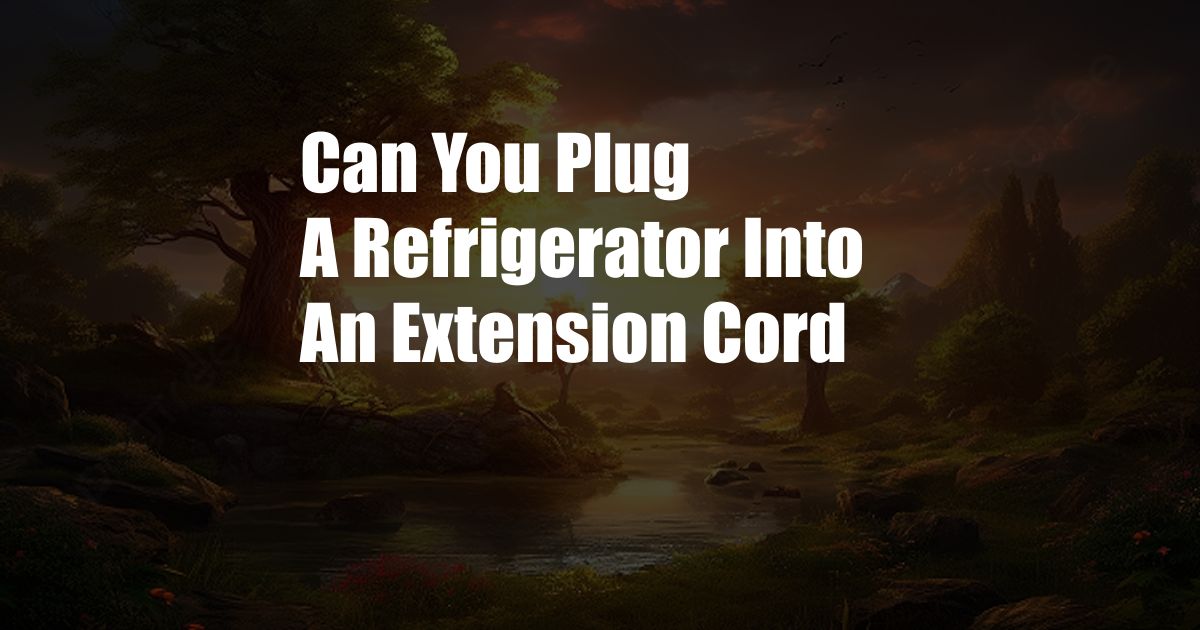
Can You Plug a Refrigerator into an Extension Cord?
Imagine preparing a delicious homemade meal for your family, only to realize that you need to move your refrigerator to accommodate your guests. But as you attempt to slide it, you notice the power cord isn’t long enough to reach the new outlet. In a moment of frustration, you ponder connecting it to an extension cord. Is it possible? Is it safe?
This scenario is more common than you might think. Refrigerators are essential household appliances, and understanding their proper use is crucial. In this article, we will delve into the question of whether plugging a refrigerator into an extension cord is a viable solution and provide expert advice to ensure the safety and efficiency of your appliances.
Extension Cords and Electrical Safety
Understanding Extension Cord Ratings
Extension cords come with specific wattage and amperage ratings indicating the maximum electrical load they can handle. A refrigerator, being a power-hungry appliance, requires a higher wattage and amperage than most other household devices. Using an extension cord with insufficient ratings can overload the circuit, leading to overheating, electrical fires, and potential harm to the refrigerator.
Hazards of Overloading Extension Cords
Overloading an extension cord can cause the wires to overheat, damaging the insulation. This compromised insulation can expose live wires, creating a significant electrical hazard. Additionally, the excessive heat can melt the cord’s plastic casing, leading to a fire risk. Moreover, overloading can reduce the efficiency of the refrigerator, causing it to work harder and potentially shorten its lifespan.
Alternatives to Extension Cords
Install a Dedicated Circuit
The safest and most reliable solution is to install a dedicated circuit for your refrigerator. This involves running a new electrical line directly from your home’s electrical panel to the outlet where the refrigerator will be plugged in. While this may require professional installation, it ensures that the refrigerator has sufficient power without relying on extension cords or overloading other circuits.
Shorten the Distance
If installing a dedicated circuit is not feasible, consider rearranging your kitchen or furniture to shorten the distance between the refrigerator’s power cord and the outlet. This eliminates the need for an extension cord while maintaining the refrigerator’s proper operation.
Use a Heavy-Duty Power Strip
If neither of the above options is viable, opt for a high-quality, heavy-duty power strip instead of an extension cord. Power strips provide multiple outlets and are designed to handle higher electrical loads. However, it’s crucial to ensure that the power strip is rated for the refrigerator’s specific wattage and amperage requirements.
Expert Advice and Tips
1. Always check the wattage and amperage ratings of your refrigerator and extension cord or power strip to ensure compatibility. Using an undersized extension cord or power strip poses safety risks.
2. Do not use cheap or damaged extension cords. Inspect the cord regularly for any signs of wear or fraying. Replace it immediately if any issues are found.
3. Avoid overloading extension cords or power strips. Never plug in multiple high-wattage appliances into the same outlet or power strip. This can strain the circuit and lead to overheating.
4. Place extension cords and power strips in well-ventilated areas to prevent overheating. Do not cover them with rugs or furniture.
5. Consider using smart plugs or surge protectors with extension cords to provide additional safety features such as overload protection and power monitoring.
Frequently Asked Questions
Q: Can I use any extension cord for my refrigerator?
A: No, you must use an extension cord rated for the specific wattage and amperage of your refrigerator.
Q: How long can an extension cord be used with a refrigerator?
A: Generally, it’s not advisable to use an extension cord for extended periods. Consider installing a dedicated circuit or shortening the distance instead.
Q: Is it safe to leave my refrigerator plugged into an extension cord overnight?
A: It’s not recommended to leave any high-wattage appliances, including refrigerators, plugged into extension cords for extended periods or overnight due to potential safety hazards.
Conclusion
While plugging a refrigerator into an extension cord may seem like a convenient solution, it poses significant safety risks if not done properly. Overloading extension cords or using undersized ones can lead to electrical fires and damage to your refrigerator. Therefore, it’s crucial to prioritize safety by installing a dedicated circuit, shortening the distance, or using a heavy-duty power strip. By following expert advice and adhering to safety guidelines, you can ensure the safe and efficient operation of your refrigerator while preventing electrical hazards in your home.
Are you interested in learning more about electrical safety and home appliance maintenance? We encourage you to explore our website for additional informative articles and resources to empower you with the knowledge you need to keep your home safe and your appliances running smoothly.